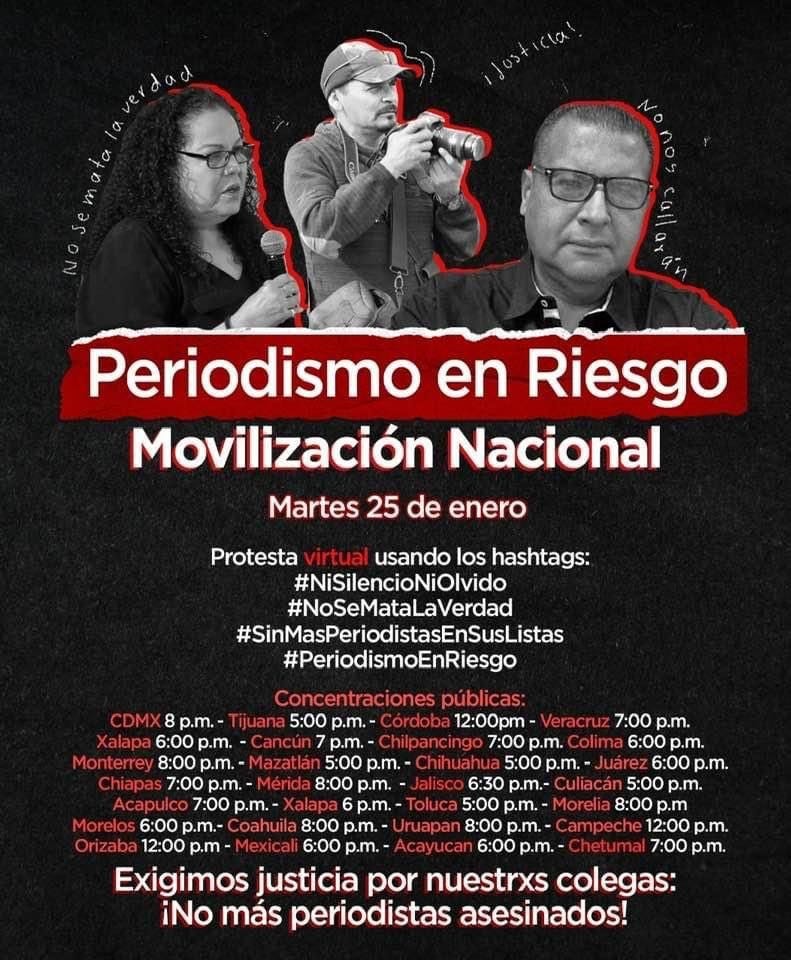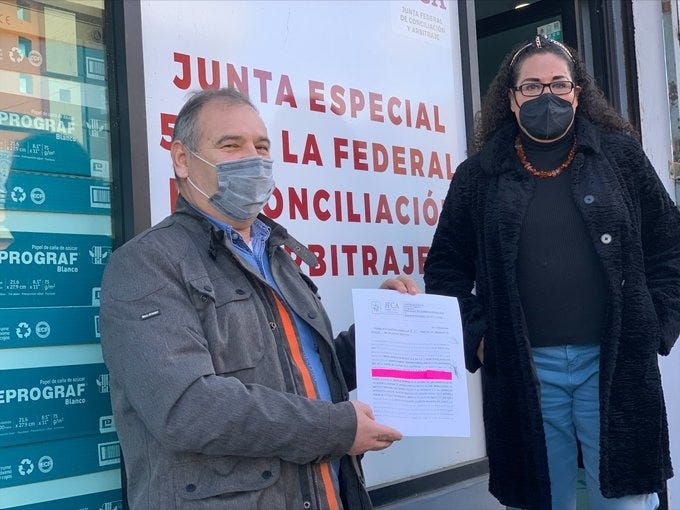Mexican journalists take to the streets after another brutal killing of a colleague
Lourdes Maldonado was the second reporter killed in Tijuana in a week. The anger and shock are enough to push hundreds rally reporters across the country to the streets.
Mexican journalists are set to stage nationwide protests today in response to the shooting of Lourdes Maldonado in Tijuana, the third journalist to be killed in the country in barely two weeks.
The planned gatherings in some forty cities across the country will likely be the largest rallies against violence and impunity staged by journalists since April 2017, after the murders of investigative journalists Miroslava Breach Velducea and Javier Valdez Cárdenas in Chihuahua and Culiacán respectively.
As their murders did five years ago, the brutal stabbing of José Luis Gamboa in Veracruz and the shootings of Margarito Martínez and Lourdes Maldonado in Tijuana have shocked Mexican journalists, especially those in Tijuana, into an outcry rarely seen among Mexico’s embattled journalists.
Icon
Maldonado was a long-time reporter and anchorwoman for radio and television shows in Tijuana. One Tijuana reporter I spoke with yesterday called her an “icon” of local journalism, known for her fierce opinions and sometimes confrontational reporting style. Most recently, she hosted Brebaje, a radio show broadcasted via internet.
Not much information about the Maldonado killing has been released by Baja California state authorities. I spoke briefly yesterday evening with Hiram Sánchez, a prosecutor of the state Attorney General’s office (FGE) in charge of both the Martínez and Maldonado murder cases.
Sánchez said state authorities are not yet ruling out any motive and have no information yet about the identity of the possibly up to three people his office believes may have been involved in carrying out Maldonado’s killing. The gathering of ballistice evidence and possible camera footage of the attack is ‘ongoing’, he added.
Dispute
Lourdes Maldonado briefly made national headlines in 2019, when she addressed president Andrés Manuel López Obrador during his daily morning press conference (popularly nown as ‘mañanera’). She asked the president for help and said she felt threatened and intimidated, something she apparently attributed to a long running dispute with Jaime Bonilla, a wealthy businessman, close political ally of the president and candidate for governor of Baja California at the time. Bonilla would win the election and assumed office that same year.
Maldonado said she was unjustly fired by Primer Sistema de Notícias (PSN), a company owned by Bonilla, almost a decade ago. A judge ruled in her favor on January 19, which could have potentially resulted in PSN having to pay her an indemnization of up to half a million pesos (approximately US $25.000), according to some news reports. Moreover, PSN would have been compelled to hand over a sizable share of its administrative and financial documents to Maldonado’s representation.
Bonilla, who as governor had an often tense relationship with critical media in Baja California, responded yesterday to Maldonado’s death in a short video released on social media. He said he had a good relationship with the reporter, confirmed the labor dispute, but said that “it never elevated to the personal.”
Regardless, Maldonado felt threatened enough to request protection from the Baja California state authorities, which she received, according to the FGE’s Hiram Sánchez. She did not, however, receive continuous police protection, but rather regular check-ins from a police patrol car.
Protests
Public opinion, especially among Mexican journalists, demands a swift response and genuine efforts by the authorities to get results soon, especially if information arises that may link the murders of Margarito Martínez and Lourdes Maldonado to their work as reporters. There is no sense of optimism among the reporters I spoke with, though, and few believe the shock and anger at this recent string of murderes will lead to genuine change.
Still, hundreds, if not thousands of reporters, human rights defenders and press freedom advocates are expected to take to the streets across Mexico today. Their voices will be heard, but it remains to be seen if it is the president who will be listening.
I will be at the protests and providing coverage on Plumas Bajo Fuego, as well as via my Twitter account.
CORRECTION: A previous version of this article erroneously stated that Jaime Bonilla was already governor at the time of Lourdes Maldonado’s appearance during the presidential press briefing. He was candidate at the time and won the election that same year. He was governor between 2019 and 2021. The text has been updated with the correct information.





